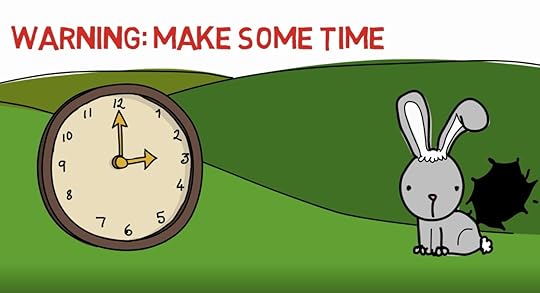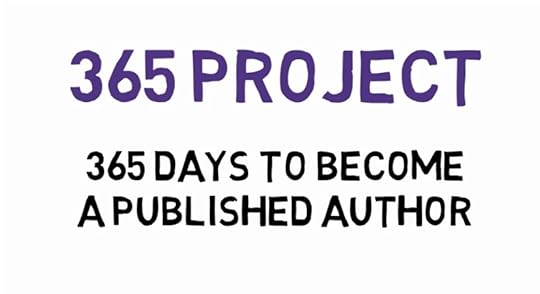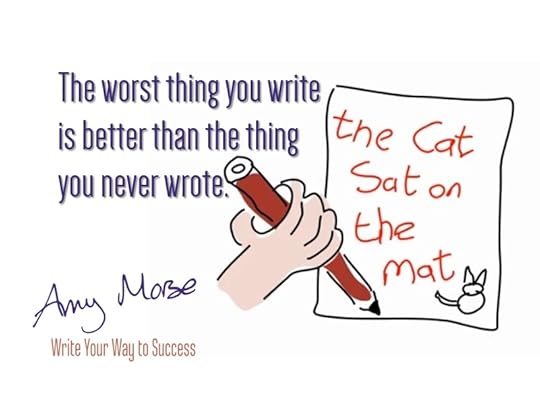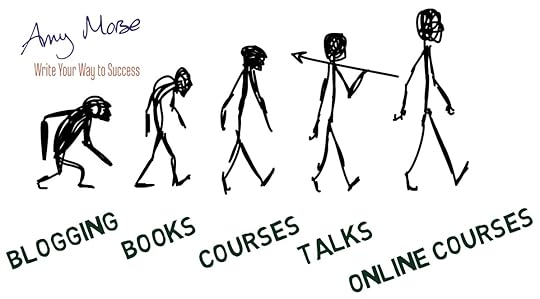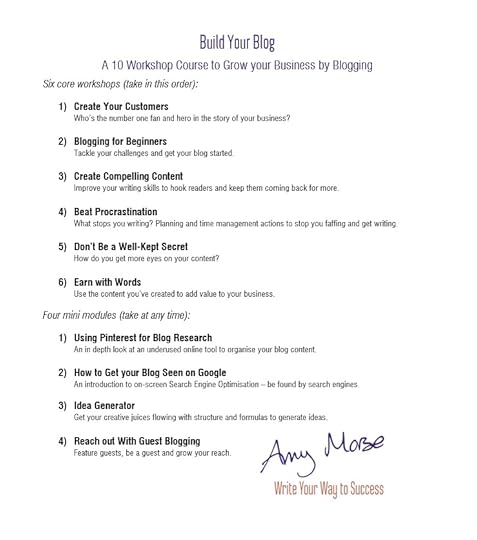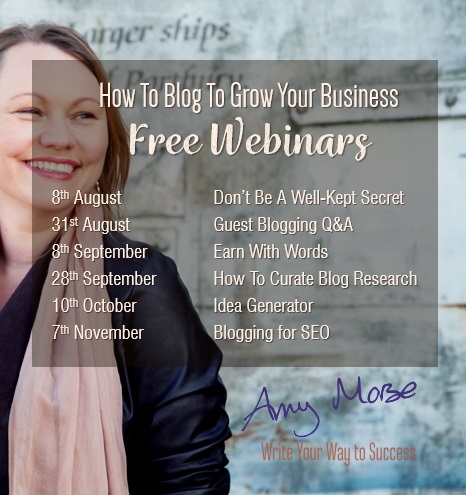Amy C. Fitzjohn's Blog, page 27
September 23, 2017
Why Blogging Weekly is Bad Advice for Newbies.
I am often asked, “How regularly should I blog?”
I’ve seen plenty of people in the online hive mind recommending weekly blogging. I’ve also had clients coming to me in a cold sweat of panic because their web designer has told them to blog weekly.
While I would agree that blogging weekly is optimal, I NEVER recommend this to someone new to blogging – here’s why…
New to blogging?
If you’re new to blogging, aiming to do it once a week is a little like running a marathon when you can’t even run for a bus!
You’re setting yourself up to fail.
You may do it initially – in the bloom of motivation we all experience from novelty – but you’ll quickly run out of steam and stall.
 It’s in these moments, where try as you might, you just can’t bring yourself to blog that those feelings of failure, or shame that you ‘should’ be able to do this, propagate.
It’s in these moments, where try as you might, you just can’t bring yourself to blog that those feelings of failure, or shame that you ‘should’ be able to do this, propagate.
A quiet voice gradually gets louder, saying… “writing is hard” or “I just can’t do this”, it drip-drips the poisonous idea that you ‘hate writing’.
You feel like you’re failing.
You’re frustrated because you should be able to do this – you’re an intelligent person, you know your stuff – so why does it have to be so hard?
Pretty soon, the temptation arises to just get shot of the problem. Why not just offload it onto someone else instead of facing up to it?
These are the moments when you may consider paying a copywriter to do it. But, there’s a professional pride stopping you, you really don’t want to have to admit defeat, and from a practical standpoint, can you really budget for such an expense every week?
You want to do it yourself, but it’s all a bit overwhelming – Just another thing nagging you from that endless To Do list: ‘Write a blog post’.
You’d feel like you’re cheating if you paid someone to write it for you, cheating yourself and cheating your clients – and besides, “this is my business. I want it to sound like me!”
Weekly Blogging is tough
Sound Familiar?
I’m a writer, I love writing, but even I still I struggle to write an original blog post every week (and writing is my thing, for goodness sake)!
I publish something at least weekly on my blog, but I don’t always write it!
Check out my ‘Reach Out with Guest Blogging’ course for more on getting content for your blog for free and supporting others, too: win-win!
(It’s cheaper than a copywriter and you’ll get people sending you blog posts for free!)
Because I’ve been regularly blogging for four years now, I’ve built up an audience, a following and a certain amount of influence as a blogger – people now approach me and offer me money to host them on my blog!
I’ve NEVER paid anyone to write for me, but I’ve had people pay me money to be on my blog! So, yes, I do get it. Sometimes it’s a relief having someone else write that ‘chapter’ in the story of my business that week. Even better if they pay you instead of the other way around!
However, it takes time to build up enough credibility for people to offer you money to be on your blog. And while you’re procrastinating, while you’re NOT blogging, you have no chance of building up a library of blogs – which you own the copyright for – to add value to many different areas of your business.
So, for someone new to blogging, how often should they blog?
My advice is to aim to write a blog once a month.
That’s all, just a few hours every month (it’ll take less time as you get into the swing of it).
Something will always happen every month in your business, so you should have no trouble coming up with ideas! Also, from a Search Engine Optimisation (SEO – in other words, getting up the Google rankings) point of view, monthly is enough to keep your website active for search engines. Also, when people visit your site, they will see you have recent content, eliminating that question about whether a business is still operating if they go to a page that’s out of date.
Monthly is enough.
Celebrate that success. Write your monthly post then reward yourself for doing it! If you manage more than that, bonus.
Paradoxically, what you’ll find once you write monthly is you’ll end up writing a blog weekly without even realising it.
You’ll be building a routine into your monthly workflow, and the lovely thing about writing regularly is that you find a flow, you get better, you get proficient and you have more and more ideas.
Before long you’ll have lists and books of ideas for blogs you’d like to write and the problem then becomes making time to write as much as you want to!
You learn to love the process of sharing your ideas and your creativity, writing a blog becomes a reward rather than a chore. It becomes something to savour, something to be proud of and something that brings great satisfaction once it’s done.
One day, you’ll look back, as I did recently, and realise you’ve been writing for years and have hundreds of articles – amazing!
Learn to love your words!
FREE ‘Creating a Content Calendar’ workshop available HERE
Save
Save
The post Why Blogging Weekly is Bad Advice for Newbies. appeared first on Amy Morse - Authorpreneur.
September 21, 2017
The Small Challenges of Small Business
My theme for September is ‘Small Challenges’ and it spurred on an idea for one of my blog followers!
I’m happy to host Dan Miller as a guest on the blog this week. 
Dan Miller is a Payments Officer with nearly ten years of experience in banking and international payments in the Australian banking sector. He has a masters degree in finance and banking. He is married and also a father of a beautiful little girl.
Over to Dan…
Small Challenges SMBs Face
While a lot of people believe that all that it takes for a business to succeed is a receptive market, a good marketing strategy and a way to keep your prices competitive, things are never that simple. In fact, in order to get where you want to be, you have to overcome numerous less known issues, while each of them has a chance of running your business into the ground. This being said, here are some of these seemingly ‘smaller’ issues, that inexperienced business owners often don’t deal with until it’s too late

Avoiding exhaustion early on
The first problem that nearly every new entrepreneur faces is that of the exhaustion. Seeing how this project is your brainchild, you will probably feel the urge to micro-manage everything. If you want things to be done right, you need to do them yourself – right? Well, this philosophy can exhaust you in no time. If your business does depend on your managerial skills, this will pose a significant obstacle in its further course. In order to avoid this, you need to start automating your SMB as soon as possible and even consider hiring a virtual assistant to help you out with some of these administrative tasks.
Solving your cash flow problems
Another thing that a lot of small business face is that of the lack of work capital. Sure, everyone gathers enough funds to launch a business but a lot of people tends to underestimate the operational costs, which can be quite substantial. Dealing with these cash flow problems can be done in several ways. For instance, you can get another credit, sell an asset or create another source of revenue (side-business, a new tenant, etc.). The most efficient way to immediately solve your cash flow financing problem, however is invoice funding. Here, you can sell some of your account receivables (the remaining payments that need to be followed through by your clients) in order to get about 95 percent of their value immediately.
Doing the proper competitive analysis
Make no mistake, researching your closest competitors is neither theft nor plagiarism. In fact, if you wanted to pick a negative label, the closest thing would be industrial espionage. Instead of using expensive analytic tools, you can simply observe the websites, social network pages and blogs of your competitors and see what works. Of course, this isn’t 100 percent accurate but since your investment is minimal, this method costs you next to nothing and gives you an incredible ROI. All the information you need is already out there; you just need to start paying attention.
Identifying your target demographic
Finally, even though it is good to have some diversity amongst the users of your products/services, most entrepreneurs agree that by focusing on too many fronts at once, you might fail to address any demographic properly. With this in mind, it is vital that you manage to identify your target demographic early on. What do they do? Where are they from? How old are they? What do they need your product/service for? Most importantly – are there any other products in your stock that they are interested in? Once you know all the answers to these questions, there will be little mystery in setting the adequate future course of action for your business.
Conclusion
While most of the above-listed four issues may seem as something quite mundane and straightforward, you would be surprised just how many new entrepreneurs fail to address them properly (or at all). Luckily, all it takes is a bit of research and a flexible business model that will allow you to incorporate these steps, without compromising the integrity of the current structure of your company. This, however, is not nearly as complicated as it may sound.
A BIG thank you to Dan for contributing!
I’m always happy to consider guests on the blog:
Is guest blogging in your Marketing plan?
Save
The post The Small Challenges of Small Business appeared first on Amy Morse - Authorpreneur.
Do I Need a Content Coach?
No one wants to be that person polluting the internet with bad content. Working with a coach will get you back on track, focus your efforts and grow your business.
Time Well Spent
Time… that immovable barrier…
‘So much to do, so little time’!
When you work for yourself, fitting everything in is a real challenge.
It’s tempting to pay someone else to write your blogs for you. I get that not everyone wants to write their own content. I get that some of us hate writing… but for those of us who take a certain pride in being able to articulate ourselves and the benefits of our business ourselves, paying someone else can feel like we’re cheating our customers and we’re cheating ourselves. It’s also potentially a wasted opportunity to build up a library of knowledge and information we can repurpose for other things in our business. You never really just use a blog post once (if you are, you’re missing a trick!), that content is yours, you own it, you can reuse it.
If you do want to make time to write great quality, effective blogs that grow your business, consider using a coach to help you.
But fitting it in…
We all have 24 hours in a day. Even the greatest minds and most successful people we can think of have this constraint. We must all sleep, eat… live our lives!
Sometimes, we just need a hearty kick in the rear and focused period of time to get into the flow of things. But getting started and staying motivated on your own is tough too – You don’t have a boss telling you what to do, you are your boss!
When you find yourself stuck, that’s a great time to work with a coach.
A coach will…
Help you find your own solutions
Be a sounding board
Listen and ask relevant, pointed questions to get to the root of your challenges
Give you actionable feedback and constructive criticism to help you improve your writing
Check your work and offer suggestions for improvement
Hold you accounatble and check up on you
Give you a kick in the rear
Be a shoulder to cry on
Set attainable, sensible goals with you to move you forward step by step, at a pace you can handle (but not too gently!)
Help you plan your time effectively so you can reach those goals
Save you time by being more productive and focused when you write content
Generate income by supporting you to create targeted content
I’ll guide you along, give you a nudge, but you have to be prepared to put in the work – you do the writing! It’s not for the fainthearted!
That’s why I offer ‘Power Sessions’!
What are Power Sessions?
A month of intensive coaching to get you writing!
The month is bookended with two 1:1 sessions over Skype. There is feedback in between and we’ll work on the Content Plan for your business.
Watch the video for more and to get a sense of how I work with my clients.
We meet over Skype, but in some circumstances, we could meet in person if you’d prefer.
Talk to me about your writing challenges.
Book in your free, no obligation exploratory call HERE
Learn to love writing and take pride in telling your story in your own words. It’s super satisfying 
September 20, 2017
Applying the Fairy Tale Formula to Your Website
From the camp fire to the internet – Stories are how we learn, we all have a tale to tell…
Stories inspire
Stories influence
Stories move people
We live our lives at the centre of our own narrative. Each blog you write is a small story in the overall story of your business.
But the structure of a story can apply to every espectof your business, not least, your website.
In this piece of contributed content, let’s look at how the Fairy Tale Formula applies…
Applying the Fairy Tale Formula to Your Website
We may not realise it, but stories play a huge role in every aspect of our lives. We are living one big narrative, and tell ourselves stories at every turn. It’s the main reason everyone has a book in them, or so they say!
And, the narrative format which features most heavily from an early age is that of fairy tales. Whether it’s Cinderella or The Little Mermaid, these are the stories on which we base our ideas of narrative. And, many of them follow a similar story arc, despite differing details.
Without noticing, many of us fall back on the fairy tale structure when we’re unsure how to move forward. And, when are we more uncertain than when delving into the world of websites for the first time? Business may seem a long way away from those comforting fairy stories. But, it’s possible that the gap isn’t as large as you think. In fact, by following those narratives, you could develop the website of your dreams. And, to prove it, we’ve put together an example of how it can be done.
The Main Character We Care About
The first thing anyone looks for in a fairy tale is a character to care about. Most often, these are young girls trying to do a good deed. Which is exactly what you need to provide for those coming to your website. You want them to care straight away, and the best way to do that is to put your face on the page somewhere. You can be your own princess. How? For the most part, putting an ‘About me’ and a photo in the sidebar of your page will work wonders. Adding this personal touch is the first step to creating lasting customer relationships.
A Cast of Sidekicks
Every fairy tale heroin has at least one sidekick. Aerial had Flounder; Snow White had The Seven Dwarves, and so on. Why do our princesses need these cute little accompaniments? Because they’re a huge help. Often, the sidekicks play a crucial role in ensuring the main character’s success.
Apply this formula to your site by getting help from an Umbraco web developer or other similar companies. That way, you don’t have to take the whole weight of your website on your shoulders. Plus, professional help will ensure you reach a top-quality finish for your page.
A Narrative Worth Reading
Everything else aside, the most popular fairy tales have a narrative worth reading. This is what keeps you opening the book time and again. But, what is your website’s narrative, and how can it help you? The narrative of your website is the blog you build, and the newsletter you send out.
And, they help you by ensuring that customers return time and again. Without these, no one will have any incentive to return. Which is bad news, because it means that you’ll fast slip from their minds. But, uploading your blog regularly and sending newsletters is a sure way to keep people reading!
Save
The post Applying the Fairy Tale Formula to Your Website appeared first on Amy Morse - Authorpreneur.
Things to Consider When Building a Website
Your website is your shop window to the world, it’s your space on the digital high street. When you’re building it, consider how to entice people in and give them a reason to browse for a while. The more people browse and get to know, like and trust what you do, the more likely they are to make a purchase.
In this piece of contributed content, there are some great tips to help you make the most of your website:
Things to Consider When Building a Website
If you’re building a website, for personal or business services, there’s a lot of things to take into account. You can consider the layout and design of your site for as long as you want, but you need to have realistic elements included as well. Having your own site means a lot more people will be trafficked your way, and plenty of cash flow can be made through your natural exposure. But what is it about building a website you really need to think about? What often missed facets are the most important for user experience? Use some of the tips below.
Don’t think less of your own website if it doesn’t match up to other people’s, as any of the possible fixes listed below can be done very easily. If you are building a website, consider enlisting the services of a webmaster if you have absolutely no clue where to start. Don’t get stressed because of this, and use the experience as a learning curve if you have to. We all have to start somewhere!
Do You Have The Best Domain For Your Purpose?
If you’re trying to establish a brand, then you need to immediately be upfront about what you offer in your domain name. If you have a blog, a catchy title presented in the domain is a good way to catch the reader’s eye. The URL is the first thing a person is presented with after all, so keep this short, sweet, and to the perfect point.
Deciding on the name is just the first step of buying a domain and having a host. You also need to consider your package and what kind of deals will be best suited to your needs. Some have plenty of bandwidth and others don’t due to the amount of different purposes a website can be used for. Bloggers have a bit of an advantage here. Plenty of pre established blogging platforms exist, including the hugely popular WordPress.
Is The Design Cleancut And Neat?
If a website is all over the place with ads, text and colors, then people are going to be very unlikely to stay for long. A lot of people lose readers and customers because the immediate garish display look too sketchy and rather reminiscent of early internet days.
Seeing as we’ve come a long way since then, you’ll need to keep a professional and friendly front. Your font should be at least point 11 and in a bold colour, and not blend in with the background. You can still craft the perfect aesthetic that you’ve had in your mind since day one even when there’s a few accompanying design tweaks, and it makes the whole presentation better as a result.
A neat design doesn’t have to mean boring however. There’s plenty of creative things you can do with a website layout that means it looks nice and functional. Minimalist aesthetics are very in, and are extremely accessible. Beautiful backdrops, like nature scenes, seem to mark out the websites of the future.
Does Your Site Seem Legitimate?
So you have your URL, but does it sound safe? Making a site seem more legitimate can be easily done by avoiding link stuffing. Bad or unsafe links will get you no fans and nowhere online, but that doesn’t mean you can’t make a few mistakes every now and then. The person behind a website is only human after all.
You can learn how to properly link with practice and research. If you need advice on how to avoid a link penalty then read around hosting the best blog posts and articles on your personal prose section of a website, and help yourself by looking for the servers best to host you.
Is Your Site Easy To Navigate Through?
First of all, do you have a search bar? If you don’t, the next step is to get one. It can be easily inputted into the website code and makes the experience of surfing your pages a whole lot easier.
Keep plenty of inbound page links at the top for even easier searching. If you have all your areas of interest and information about you or your company within accessible reach, there’s plenty of trust established as soon as a person sees these links.
Sidebars should also be utilised properly. It’s usually best to have a photo of you or someone who’s important to your company here, and include any information that needs to go under the photo. A simple caption goes a long way, and it also can remind readers that if they need to contact you they can. So it’s also a good idea to include a direct link to a ‘submit query’ page or your email address.
Are You Going To Be Active Enough?
If you have a website, you need to be on it to use it properly. The digital world is ever evolving and always comes up with new trends and technologies in what seems like minutes. As a result, anyone not around for more than a week at a time can be left in the dust.
Even if you have something other than a blog, regular updates will keep people coming and make your efforts look less like a one time scam. You’re most likely going to be posting something once a day, as you’ll understandably have a lot to talk about, but even if you don’t, it’s not a bad thing. Having a new post out at least once a week, even if it’s something like developer notes, lets your readers or potential customers know you’re still around and at their service.
Website building needn’t be a panicked process, as it can often be done yourself even when you don’t have the necessary knowhow. Plenty of crafting platforms exist nowadays and are constantly at your service. Even if you haven’t been online for a long time, you can bring something fresh to the table. Start with the little things and build up from there.
Save
The post Things to Consider When Building a Website appeared first on Amy Morse - Authorpreneur.
September 18, 2017
How I Started Blogging
Behold, my first ever blog post (after the obligatory – “Hello I’ve started a blog” post – much like tweeting your name!)
I started my first blog on Blogger in 2013 with my Head Full Of Popcorn poem:
Take a handful of popcorn corn, throw it into a frying pan and see it scatter.
Some of the corn will pop and settle.
Some will pop and fly out of the pan, forever lost down the back of the cooker.
Some will just smolder and burn and smell bad.
Some will stubbornly refuse to do anything, no matter how many times you try to cook them.
You can take a handful and enjoy it, but there will always be a few that taste funny or didn’t pop properly.
That’s how I would describe the way my brain works – I just have a head full of popcorn!
For me, blogging started as a creative playground.
It was a way to get my words out there, a way to publish my own e-zine and later evolved into a way to hold myself accountable and share tips for other people going through the process of writing, publishing and selling a book.
I’ve started, but I’m not finished
I started on Blogger.com. It’s free, hosted by Google and all you need is a Gmail account.
As I published more books and completed the Sheridan and Blake Series, I was slowly building a part-time business as an author, while working a day job as a trainer for startups.
I attribute my 5,000+ books sold over 4 years to a solid foundation of blogging and sharing – in other words, ‘Content Marketing’.
In 2015 when I started my Amy Morse consultancy business – I knew a blog for my client base of small businesses bootstrapping through growth and wanting to improve their writing skills – would be the key element in my marketing.
Over the past 4 years, I’ve written 159 blog posts on that original blog – which later became my Amy C Fitzjohn author blog – and a further 115 posts on this blog. OK, taking out guest blogs and contributed posts, I estimate I’ve written 250 blogs in that time (and that’s not including posts I’ve written on other people’s pages or on my Linked In profile) – It’s amazing how quickly it adds up!
That’s 250+ potential…
Sources of revenue
Links to share to answer questions
Items to share on social media
Small stories about my business journey
Calls to action for people to directly engage with me
And the next step in this blog evolution…?
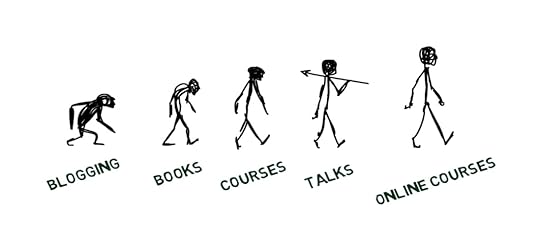 eWorkshops
eWorkshopsMy ‘Build Your Blog’ course is for entrepreneurs wanting to grow their business through blogging.
Not only am I sharing my secrets, I’m doing it in a step by step, intuitive way so participants will be taking the appropriate steps at the appropriate time. Much of the content, the downloads and activities are based on blogs from that archive of 250+ posts.
I’m releasing the workshops individually as I build them, with the full course launch planned for the new year.
Get your FREE ‘Creating a Content Calendar’ workhop here:
Be one step ahead and jump the queue for these workshops. Join a free webinar today for taste of the inspiration and insights on offer in the full course.
Give me a free webinar ticket NOW!
Save
Save
The post How I Started Blogging appeared first on Amy Morse - Authorpreneur.
September 6, 2017
Two Things You Can Do To Improve Your Blogs
 In the past 10 years, we’ve published more than the entirety of human history. That’s an awful lot of blogs, and just by the law of averages, an awful lot of rubbish!
In the past 10 years, we’ve published more than the entirety of human history. That’s an awful lot of blogs, and just by the law of averages, an awful lot of rubbish!
Better writing creates better businesses.
As more and more of our world goes online, with increasing smartphone use – there are currently 2.3 billion smartphone users globally – well written, compelling content is essential.
While it’s fair to say, video, images and audio are gaining in popularity – even a video needs to be described in writing to be found by search engines, and the best video and audio content will be scripted, and at the very least pre-planned, if it is to be effective.
There really is no excuse for bad writing in the Digital Shop-e-verse!
But the good news is, there are lots of small things you can do to improve the quality of your writing, and therefore, improve your blogs.
In particular, there are two small things you can do that will have a BIG impact on the quality of your blogs.
1) Write Regularly
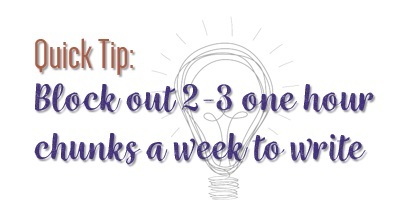
Even just small bursts of writing, the more you do it, the easier it will become.
Block out time 2 to 3 times a week just to write, even if it’s just an hour each time.
You don’t even have to write with an outcome in mind, stream of consciousness writing is a valuable way to start the words flowing.
Read my blog on ‘Unintentional Writing’ for more on this.
Don’t question it, don’t second guess yourself, don’t pressurise yourself, just do it.
Just write!
2) Get Help
There is only so much you can improve through practice alone.
You need feedback too – and not just your mum massaging your ego – I mean constructive, professional and independent criticism and feedback.
The formula to improve anything is:
There is plenty of free information out there, but investing in your own personal development and your own writing, working with a coach and taking action through education, will move you forwards much more rapidly than muddling along alone.
Join a FREE webinar with me for some tips, insights, inspiration and support to improve your blogs HERE
You can find replays of past webinars HERE
Save
Save
The post Two Things You Can Do To Improve Your Blogs appeared first on Amy Morse - Authorpreneur.
August 21, 2017
How To Scare People Away From Your Website
Your website is your virtual shop window. If it’s tatty, outdated or clunky why should anyone hang out there?
Having a blog on your website attracts 97% more traffic, but there are plenty of ways to scare people away once they get there!
This short piece of contributed content is crammed with useful tips and insights to refurbish your virtual shop and make the most of your website:
Why Your Website Is Just No Good
Having a website in this day and age is a normal thing, whether you have a business or not. Of course businesses have websites, but regular people have websites for the sheer fun of it too. Why do we build websites? To share our message, to raise awareness, to create conversions, and so many other reasons. However, not all websites are created equal. If your website doesn’t seem to be getting the traffic you want, has a high bounce rate, or isn’t getting conversions, there is going to be a good reason for it. Read on to find out why your website is just no good:
It Looks Unprofessional
There’s a huge difference between a site that looks professional and a site that doesn’t. If your site doesn’t look professional, people are going to find it difficult to trust and are less likely to do what you want them to do, whether this is make an order or sign up to your email list. One of the best ways to get a professional looking site is to have it designed by a professional company. It will cost more money, but it’ll be worth it if you can find a company that knows what they are doing and will listen to what you want. You can do it yourself with free templates if purchasing a custom one isn’t an option right now, though.
You Haven’t Included The Most Important Pages
You may think that the most important pages are your home pages and product pages, but you’d be wrong. Usually, the most popular page on a site is the ‘About me’ page or ‘about us’ page. Including fun information about you or your company, as people nearly always want to know more about who they are buying from before they make an order. Your Contact page is also very important. Include all relevant information, including multiple ways to contact you.
It’s Too Slow
If your site is slow, people are going to leave and head to a competitor almost right away. It’s unusual for a person to wait more than a second or two for a page to load, so make sure yours isn’t bogged down. Get rid of anything that could be slowing it down, and make sure you have high quality web hosting to complement this. You can still get the cheapest web hosting without it impacting your site negatively, so don’t worry about spending a fortune.
The Content Is Rubbish
You need to make sure your site content compels readers to take action. If you don’t consider yourself a talented wordsmith, outsource this service, or get help to make a bigger impact.* This goes for content on your permanent pages, as well as content on your blog.
You’ve Forgotten All About SEO
SEO (Search Engine Optimisation) and similar online marketing techniques are a must so that your site gets found by the right people. Make sure you’re using SEO techniques, appropriate keywords, and even split testing so you know that your site is as effective as it can possibly be. You can’t usually do this alone, so be prepared to allocate a portion of your business budget to online marketing!
*Talk to me about Content Coaching.
Join a FREE webinar to find out more about how to grown your business with a blog.
Save
Save
The post How To Scare People Away From Your Website appeared first on Amy Morse - Authorpreneur.
How to Blog To Grow Your Business – Free Webinars
Blogging has been part of my life since 2013.
That was the year I published my first book – The Bronze Box.
Setting my words loose into the wild was the catalyst!
At the time, I did a 365 project – Operation Author: 365 Actions To Become an Author.
Every day I did one thing to accomplish my lifelong dream of publishing a book, then I blogged my seven actions once a week. I soon established a following and it motivated to me to accelerate the pace to get the book out there.
I set myself a target to sell 1,000 copies of The Bronze Box in 3 years. I’d sold double that in the less than half the time!
Solomon’s Secrets and the Gabriel’s Game books quickly followed. I attribute their success to my blog and the impact of content marketing.
Watch the story of ‘Amy Queen Of Blogs’ here:
I’ve built my entire business around blogging, but the blog itself is not the business – the blog supports every aspect of my business; from brand building and knowledge sharing, to inviting more people to browse around my virtual shop, and building information products that add value to my business.
What started as a way to share my words with the world blossomed into so much more.
My tips to help others improve their blog to boost their business became:
The basis for training materials
Key note talks at events
…and now they’ve evolved into my ‘Build your Blog’ online course.
The first mini module of the 10 module course – Reach Out With Guest Blogging – is out now for the pre-launch offer price of £50/$65, just to give people a taster of what’s to come in the full course
You can get lifetime access to the ‘Reach Out with Guest Blogging’ mini workshop HERE – Get in there quick, as more workshops become available the price will increase!
For all of the workshops in the full ‘Build Your Blog’ eCourse there is a FREE Webinar:
I started the webinars earlier in the year. here are the links to the replays of past webinars:
Create Your Customers WATCH HERE
Blogging for Beginners WATCH HERE
Beat Procrastination WATCH HERE
Don’t Be a Well-Kept Secret WATCH HERE
There are more webinars coming up:
Get your tickets for the next webinars HERE
Save
Save
Save
The post How to Blog To Grow Your Business – Free Webinars appeared first on Amy Morse - Authorpreneur.
Business Branding Is Important, But Are You Getting It Right?
In this piece of contributed content, I’m sharing some basic building blocks for branding impact.
My clients are entrepreneurs who ‘are their business’. My Power Sessions and online workshops give them the tools and the confidence to build their own personal brand, by embracing the power of their own words and creating compelling content that adds real value to their business.
Business Branding Is Important, But Are You Getting It Right?
When it comes to running a successful operation, all business owners will have to focus at least some of their efforts on branding. There are lots of ways to approach that issue, and many people get it wrong. Considering that, this article will provide some excellent advice and suggestions that any entrepreneur can use. Most of the ideas will also apply to anyone starting a new blog. Put these tips into action, and company bosses should get much better results from their branding activities. When all’s said and done, individuals could have the best products or services in the world, but they will never make a killing if they don’t get their branding right.
Design the perfect business logo
Logo design is often a complicated subject. That is because the graphic needs to say something about the nature of the operation. So, it’s sensible to note down lots of words and phrases that seem suitable. Business owners should then look for images that represent those selected terms. Of course, there are many professionals out there who design logos on behalf of new companies. Some people opt to outsource their logo design because they benefit from the expertise of specialists. The advantages of outsourcing that job include:
High-quality designs
Fast turnaround times
Low cost
Decide on fonts and colour schemes
Branding is about more than just using the same logo all the time. In many instances, it also means selecting an appropriate colour scheme and some fonts. Business owners should then use the same ideas on their websites and all promotional materials. With a bit of luck, that will help the brand to become more familiar to consumers. Just remember that less is usually more. Don’t make the mistake of using weird and wonderful colours or text because that could cause problems. Just opt for something that’s straightforward and easy to understand. To get some inspiration, just check out:
Competitor branding
Traditional fonts and colour schemes
Think of a slogan or motto
Finally, it’s time to refer back to that list of words that are associated with the business. Try to work out if it’s possible to use them to create a slogan or motto. Company bosses should then place that phrase on all promotional documents and letters. It’s also sensible to include it on the website in most instances. If people struggle for ideas, they can just type some of the words into Google and add the term “quotes” before pressing search. Hopefully, the search engine will then identify some useful phrases people can use to make their slogans. A good motto should:
Highlight the ambitions of the company
Draw attention to ethics like professionalism
Entrepreneurs who read this article just have to use that advice to ensure their companies move in the right direction. While nobody wants to spend thousands on branding, it’s wise to make a reasonable investment for the best results. Firms that fail to focus on that issue will struggle to become household names in most situations. So, replicate the approach taken by successful competitors and work on improving business branding as soon as possible!
Save
Save
Save
Save
Save
The post Business Branding Is Important, But Are You Getting It Right? appeared first on Amy Morse - Authorpreneur.






